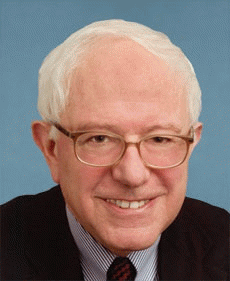
File:Bernie Sanders 113th Congress.jpg - Wikimedia Commons
(Image by (From Wikimedia) US Congress, Author: US Congress) Details Source DMCA
Duluth, Minnesota (OpEdNews) April 16, 2016: Following his bruising debate with Hillary Clinton in Brooklyn, Senator Bernie Sanders of Vermont flew to Rome to speak at a Vatican conference. On Saturday morning, he had a private meeting with Pope Francis in his residence. The Jewish senator and the Roman Catholic pope excel at denouncing rich people who excel at being greedy. Birds of a feather flock together.
As progressives and liberals know, the rich people in the world today keep getting richer, but an estimated one billion people in the world today live on a dollar a day or less. See Paul Collier's book The Bottom Billion: Why the Poorest Countries Are Failing and What Can Be Done About It (Oxford University Press, 2007).
As progressives and liberals know, the Republican Party includes economic libertarians such as the Koch brothers -- some of whom live under the influence of Ayn Rand's novels, as does Representative Paul Ryan from Wisconsin, who claims to be a Roman Catholic.
Pope Francis follows the Roman Catholic tradition of thought in emphasizing the common good. No doubt the Koch brothers and other greedy billionaires imagine that their philanthropic foundations contribute to the common good. Their philanthropies show that the common good may not be a strong enough conceptual framework for calling attention to certain problems involving greedy billionaires.
But what conceptual framework, if any, might be more adequate? In the ambitious and accessible new scholarly book Commonwealth and Covenant: Economics, Politics, and Theologies of Relationality Will B. Eerdmans Publishing, 2016), Marcia Pally creatively constructs a fresh new way of thinking about the ancient Hebrew conceptual framework of the covenant, the conceptual framework that the ancient Hebrew prophets such as Amos worked with. No doubt the ancient Hebrew prophet Amos is the example followed today by Pope Francis' inveighing about greedy rich people today and by Senator Sanders' inveighing about greedy rich people today.
I would liken Marcia Pally to both a busy bee flying from one flower to another and then another gathering food for thought from various authors, including certain secular authors, and to Anansi the clever spider as she constructs her spider's web of thought in her new book.
However, I am sorry to report that Pally does not mention the work of the American Jesuit cultural historian and theorist Walter J. Ong (1912-2003), who claimed that his work was phenomenological and personalist in cast. See the 2015 revised edition of my book Walter Ong's Contributions to Cultural Studies: The Phenomenology of the Word and I-Thou Communication.
In terms of broad categories, the personalism of the French author Emmanuel Mounier was a subset of European existentialism. In the United States, personalism found a home in theology at Boston University, where the young Martin Luther King, Jr., studied personalism -- as Pally notes in passing (page 26, esp. footnote 76). (Almost every page of the 350-page text of her book includes footnotes at the foot of the page.)
Now, in the 1966 book The Duality of Human Existence: An Essay on Psychology and Religion, David Bakan, a Jewish faculty member in psychology at the University of Chicago, works with the terms agency and communion. According to him, we can seriously over-develop either psychological tendency, in which cases we tend to serious under-develop the other psychological tendency. In his view, the optimal development of both of these tendencies would be desirable.
Vicki S. Helgeson in psychology works with Bakan's two terms in her own psychological research, which she ably sums up in her 700-page textbook The Psychology of Gender, the fifth edition of which is scheduled to come out this summer.
The spirit of communion is involved in communication when two or more persons commune with one another.
What Bakan and Helgeson refer to as agency is involved in what Pally refers to as separability and distinction. Conversely, what they refer to as communion is involved in what she refers to as situatedness and relation.
Now, the Jewish sociologist at Harvard David Riesman delineates three basic character types in American culture in his 1950 book The Lonely Crowd: A Study of the Changing American Character: (1) outer-directed people (also known as tradition-directed people); (2) inner-directed people; and (3) other-directed people. Because Riesman himself was a deeply inner-directed person, he was worried about the then-emerging other-directed people that he describes.
In Pally's terminology, outer-directed people (also known as tradition-directed) tend to be overly involved in their cultural situatedness -- and not sufficiently differentiated to develop their own personal separability and distinction.
In Pally's terminology, inner-directed people tend to have over-developed their sense of separability.
(Note: You can view every article as one long page if you sign up as an Advocate Member, or higher).




